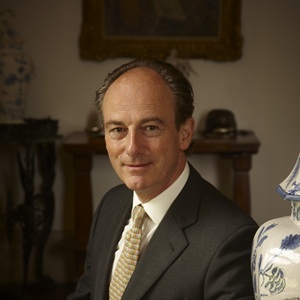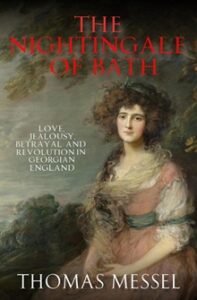Thomas Messel, what first attracted you to the period or periods you work in?
The focus of my study was a late eighteenth-century ancestor called Elizabeth Linley. I was aware that she eloped with and married the playwright Richard Brinsley Sheridan, but initially, I knew little more until I delved deeper into her life. This revealed a truly fascinating character, who was not only a famous singer and beauty but opened up her unknown involvement in the writing of Sheridan’s plays and opera, her close connection with the Whig party, her opposition to King George and the East India Company, her role in the Warren Hastings Impeachment, and her support for the Prince of Wales’s 1789 failed Regency power grab.
Can you tell us a little about how you research? Has the process changed over the years?
My first book, Oliver Messel in the Theatre of Design (Rizzoli 2011), relied entirely on primary source material and photographs garnered from public and private collections. Extensively, this book was the work of my co-writers, my role was primarily that of Editor and coordinator. In the case of my recent book, The Nightingale of Bath, due to the scarcity of access to much primary source material, I have relied more on published letters and biographical material.
The common phrase is that history is written by the victors. Do you think this is true?
I think that the answer is more nuanced. The victors indeed have the privilege of the propaganda to exploit the moment and edit the truths or suppress those which might be inconvenient. However, I believe that with the flood of access to new research material and modern media, authors are able to submit revisionist opinions.
Are there any historians who helped shaped your career? Similarly, can you recommend three history books which budding historians should read?
As my career has been the designing and creating extremely fine furniture, it has not been shaped by any individual historian other than my own fascination for all things Baroque to Neo-Classical.
Three historians whose writing I particularly admire are: Charles Spencer, To Catch a King and its sequel Killers of the King. Andrew Roberts’s George III, The life and Reign of Britain’s most Misunderstood Monarch and Harold Acton’s The Last Medici.
If you could meet any figure from history, who would it be and why? Also, if you could witness any event throughout history, what would it be?
I would have been intrigued to have met The Prince Regent. I am sure that I would not necessarily have found him a particularly likeable character, but a discussion on his passion for building, design and collecting would certainly not have been dull. To a designer like me, he would have been a dream client, but only if he paid his bills.
It would have been wonderful to have spent time in the Great Library of Alexandria, which housed all the knowledge of the world. In its vast archives of up to 400,000 scrolls, it incorporated the history, literature, plays and philosophy of Ancient Greece, as well as all the sciences, medicines and all the inventions that were known. Its final destruction in 391AD by Christian forces was an act of ignorant anti-pagan vandalism, which robbed the world of a great treasure. Without this knowledge, there could be no wisdom, which I believe precipitated the Western world’s decline into the “Dark Ages”.
If you could add any period or subject to the history curriculum, what would it be?
I think in the face of current world affairs, the study of the Peloponnesian wars would be an appropriate subject. This war lasted for an interminably long period between 460-404BC, a contest between the democracies of Athens pitched against the military muscle of Sparta. Nature abhors a vacuum where not only did the fall of Athens leave a void to be filled by Macedonia whose brief fragmented empire stretched as far as India and parts of Africa, followed by Rome whose rule covered Europe and the known world, the influence of which is still relevant today, and shapes the world in which we are living. But Sparta’s brutish dismemberment of Athens demonstrates the futility of war and the ephemeral nature of victory, as the art, philosophy and culture of Athens hold enduring influence.
If you could give a piece of advice to your younger self, either as a student or when you first started as a writer, what would it be?
One regret that I have is that at school, nobody took my keen interest in history seriously, so I focused my direction on pursuing an army commission. However, when my history A-level results were announced, they were amongst the highest in the country, and any possibility of studying further at university had been missed. However, this has never deterred my abiding fascination for history. So, my advice to any student is to question the opinions of others and make sure to follow up on every possibility open to you and be prepared to change.
Can you tell us a little bit about the project you are currently working on?
This is a sequel to my recent book, which covers the life of the enigmatic Pamela Simms (Aka Pamela de Genlis). She was the natural daughter of Philippe Egalité (Duke of Orleans), who bore so striking a resemblance to my deceased heroine, Elizabeth Linley, that she was mistakenly believed to be her and even married her lover, Lord Edward FitzGerald, with whom she shared a precarious life as a French and then an Irish revolutionary.
Thomas Messel is the author of The Nightingale of Bath, a novel covering the life of the singer and beacon of the Whig party, Elizabeth Linley.







